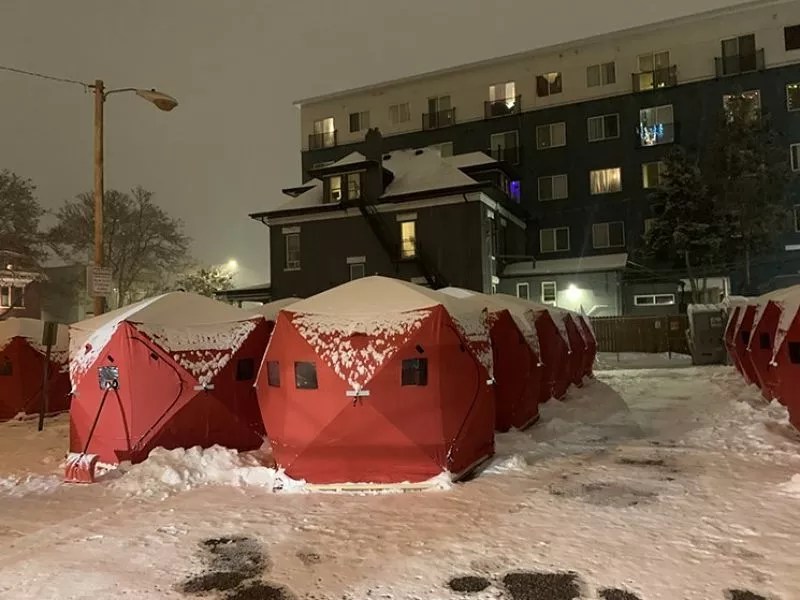
Conor McCormick-Cavanagh

Audio By Carbonatix
After being adopted as a temporary fix for homelessness during the pandemic, Denver’s safe-camping site program may soon become a permanent tool for city officials.
“I think they have been demonstrated to be a really effective and a very orderly alternative to street homelessness. They have demonstrated that they help people stabilize. We have seen more than 180 people move to more stable housing,” says Councilwoman Robin Kniech, a major proponent of safe-camping sites in Denver in recent years.
Kniech and Councilman Chris Hinds plan to sponsor a zoning code amendment that will move the language that authorizes safe-camping sites from a temporary administrative rule tied to the pandemic to a permanent section in the Denver zoning code.
“This zoning code update is about making sure we have every tool available to us to help resolve unsheltered homelessness. Safe Outdoor Spaces have helped people for whom traditional congregate shelters are not an option – such as couples, people with pets, and people with post-traumatic stress disorder – connect with life-saving shelter, services and supports,” says Laura Swartz, a spokesperson for the Denver Department of Community Planning & Development.
For years prior to the pandemic, advocates for people experiencing homelessness in Denver had pushed for establishing sanctioned areas where people could live together in tents without fear of being cleared out by local authorities. But the administration of Mayor Michael Hancock balked at the concept, instead pointing to the camping ban whenever such a suggestion was made.
The pandemic flipped that thinking. Although it took him some months to come around, in the summer of 2020, Hancock announced his support for the establishment of safe-camping sites that would be run by nonprofit organizations. That November, Tina Axelrad, the Denver zoning administrator, created a temporary unlisted use to allow for safe-camping sites until December 2023. The use was pegged to the pandemic and the urgent need for alternative sheltering options, because city officials were worried about spacing requirements in traditional shelters and needed to address guidance from the Centers for Disease Control and Prevention that instructed municipalities not to sweep encampments.
“That was a bit of a compromise for the people of Denver, so they’d be willing to take a chance on having Safe Outdoor Spaces,” says Hinds, whose district hosted the first two sites, which opened in December 2020 in the Uptown neighborhood.
Some neighbors were trepidatious at first. There were concerns about the potential for criminal activity, drug use and the degradation of neighborhood character. But the sites have stood in strong contrast to unsanctioned encampments on the streets of Denver. They’re clean, and they feature bathrooms, services and uniform living quarters – usually ice-fishing tents, but also pallet shelters. A few dozen people live at each site as they work their way toward housing.
The Colorado Village Collaborative has been the main organization leading the safe-camping site charge in Denver; it operates the three current sites in Montbello, Barnum and Clayton, thanks to millions of dollars in annual city funding.
“I think it’s going well. While the legislation would be permanent, I also want to make it clear that a Safe Outdoor Space is never meant to be permanent for any individual. A temporary managed community is never meant to be permanent for any individual,” says Hinds.
Adds Kniech, “In an ideal world, you have a cure. In this case, the cure to homelessness is housing, and we’re doing that. We’re building supportive housing, we’re doing rapid rehousing, but the need is greater than the cure that we have. You also need an interim solution.”
The safe-camping site program has hit some bumps. Neighbors have sued and filed administrative complaints, but none have succeeded in preventing sites from opening in certain parts of Denver. A fire at one safe-camping site last September left numerous tents burned and residents displaced; it was ultimately replaced by a new site in another neighborhood.
But the program continues to have full buy-in from Hancock and also many of the candidates running for mayor, who regularly speak about establishing more sites to chip away at unsanctioned homelessness on the streets of Denver.
“Now that the emergency orders are coming to an end, we need to sustain this solution,” Kniech says.
The proposed zoning-code amendment would also create permanent permission for some safe-parking sites, where people experiencing homelessness who still own cars can sleep safely. City staffers anticipate an initial Denver Planning Board hearing and vote on the proposal in April.